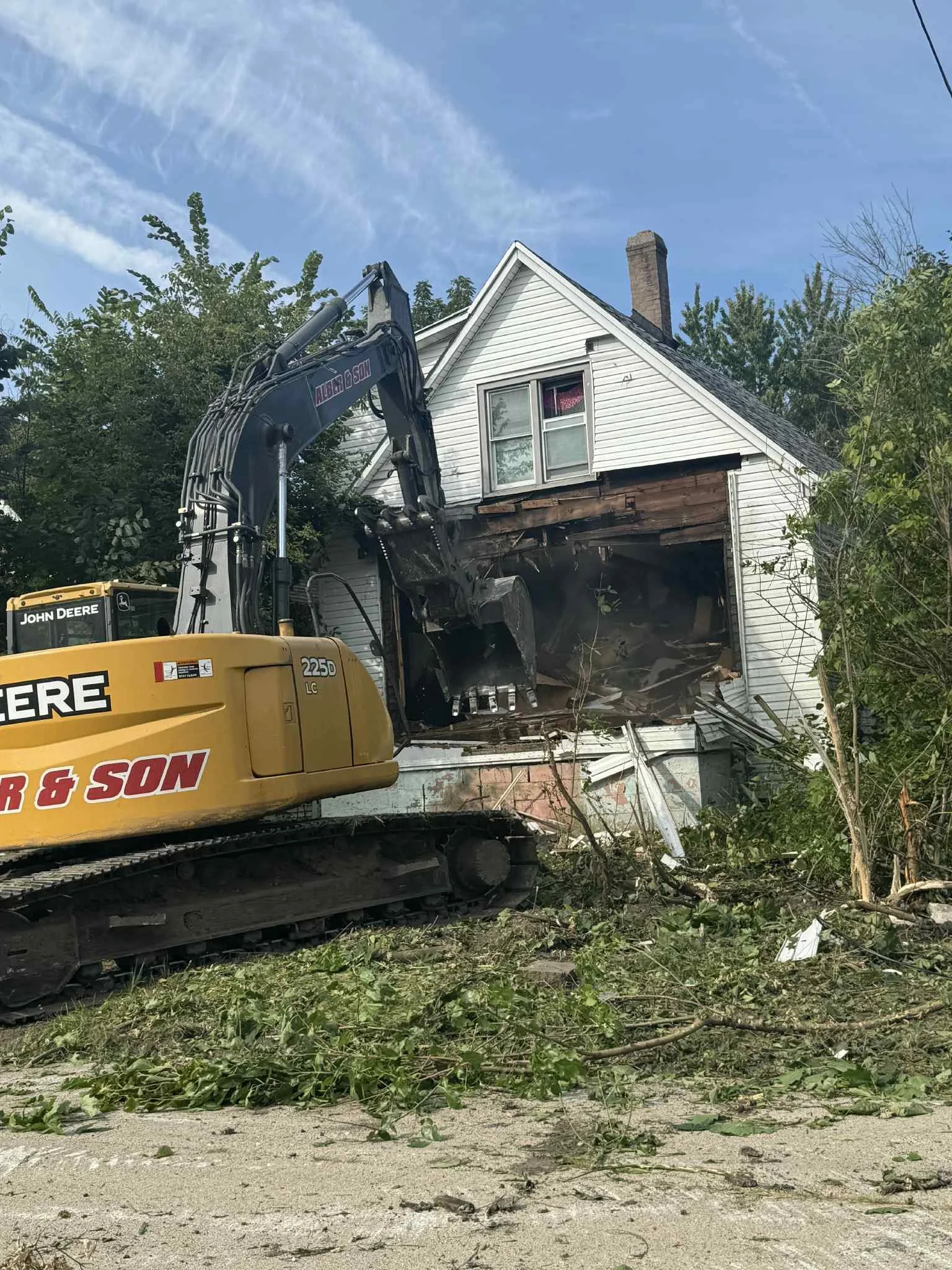Demolitions in Freeport:
Is Public Health Being Ignored?
FREEPORT, IL – September 10, 2025
The Environmental Protection Agency (EPA) has issued unambiguous guidance: dust control during demolitions is mandatory. The practice is not a matter of preference, convenience, or cost-cutting — it is a requirement designed to protect the health and safety of communities. The EPA’s rulebook is rooted in decades of scientific research, showing that uncontrolled dust from demolition sites is far more than a nuisance: it is a toxic hazard capable of causing lifelong damage.
When homes are demolished, the debris that becomes airborne almost always contains a cocktail of dangerous substances: asbestos fibers from insulation and tiles, lead from paint, mold spores from old water-damaged structures, silica from concrete and brick, and heavy metals embedded in dust. Without wetting down these sites, the demolition process unleashes an invisible storm of carcinogens and toxins across neighborhoods.
Why Watering Matters
Wetting down a demolition site is simple but effective. Water binds dust particles together, making them too heavy to float on the wind. This prevents toxins from spreading beyond the immediate site. Chicago, Wheaton, Glen Ellyn, and other Illinois communities mandate this practice because they recognize its power to reduce harm. The failure to wet down structures in Freeport, where dozens of demolitions have taken place in residential neighborhoods, has left families exposed to hazards they cannot see but will feel for decades.
Consider what happens when this dust is inhaled:
Asbestos fibers lodge in the lungs. They do not break down, and decades later can trigger deadly diseases like mesothelioma, asbestosis, and lung cancer.
Lead dust, even at microscopic levels, can cause irreversible brain damage in children. It affects IQ, learning ability, and behavior. The CDC has stated flatly: there is no safe level of lead exposure for children.
Silica dust scars the lungs, causing silicosis, an incurable and sometimes fatal condition. Prolonged exposure also increases the risk of lung cancer.
Mold spores spread respiratory illness, exacerbate asthma, and weaken immune systems, particularly in children and the elderly.
Every gust of wind carries these toxins farther into the community. They settle into yards, cling to clothing, and infiltrate homes through open windows. Once airborne, there is no putting the dust back. The damage is done.
Freeport’s Failure
Despite these well-documented dangers, Freeport has failed to enforce dust suppression. Over Mayor Jodi Miller’s tenure, the City Council has approved demolition after demolition without requiring wetting or monitoring. Since August alone, 17 home demolitions have been awarded to Alber & Son Earthworks, a company owned by Mayor Miller’s family. Observers have reported no evidence of dust control being used on these sites.
Equally troubling is the role of Wayne Duckman, Freeport’s Director of Community and Economic Development. Through his private company, Ultimate Surveying Application Corp, Duckman is tied into the permitting and oversight process — raising conflict of interest concerns while demolitions proceed unchecked.
When both the mayor’s family and a top city official are directly connected to the demolition process, and when EPA guidelines are ignored, the people of Freeport are left to wonder: whose interests are truly being protected?
Consequences of Ignoring the EPA
The EPA takes demolition dust seriously, and with good reason. Under the Clean Air Act and the Toxic Substances Control Act, municipalities and contractors can be held liable for failing to control emissions of asbestos, lead, and particulate matter.
Civil Penalties: Companies that ignore EPA rules can face fines of up to $37,500 per day, per violation. These fines can quickly escalate into the hundreds of thousands of dollars.
Criminal Charges: In cases where violations are willful or show “knowing endangerment,” individuals — including company owners and city officials — can face federal criminal prosecution. Penalties may include prison sentences.
Lawsuits: Residents exposed to toxins have the right to sue for damages. In numerous cities, class action lawsuits have been filed against municipalities and contractors who failed to suppress demolition dust.
Federal Enforcement: The EPA has authority to investigate and intervene directly when local officials fail to enforce dust control, particularly in cases of asbestos and lead contamination.
For city officials like Mayor Miller and Director Duckman, the implications are stark. Ignoring EPA guidelines is not just negligence — it may expose them and their affiliated businesses to civil, criminal, and financial consequences.
What Residents Can Do
Freeport residents do not have to sit quietly while their health is jeopardized. The EPA provides direct channels for citizens to report violations. Complaints can be filed anonymously, and every report must be investigated.
How to File a Complaint:
EPA Online Complaint Form (Region 5 – Chicago):
Visit EPA Report Environmental Violations.
Select “Air Pollution” as the violation type.
Include demolition address, date, contractor (Alber & Son Earthworks), and lack of dust suppression. Mention oversight concerns involving Ultimate Surveying Application Corp.
Call EPA Region 5:
Phone: (312) 353-2000 (Chicago office).
Ask for the Enforcement & Compliance Office.
Illinois EPA (Springfield Office):
Phone: (217) 782-3397
Website: Illinois EPA Complaints.
Gather Evidence:
Take photos or videos of visible dust during demolitions.
Document addresses, dates, and weather conditions.
Keep copies of city permits, contracts, or council approvals tied to Alber & Son Earthworks or Ultimate Surveying Application Corp.
The Bottom Line
This is not a minor oversight. Freeport’s failure to enforce dust suppression during demolitions represents a direct threat to public health. It violates EPA guidelines, places families at risk, and shields private interests tied to city leadership.
The EPA’s rules are clear. The dangers are proven. The penalties for ignoring these standards are severe. The only question left is: why are Freeport’s leaders putting the community in harm’s way?
Freeport residents deserve clean air, safe neighborhoods, and city officials who prioritize public health over personal profit. Until that standard is met, it is up to the people to demand accountability — through their voices, their votes, and their complaints to the EPA.






